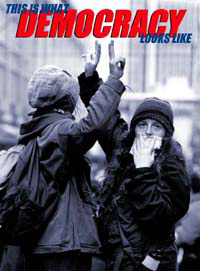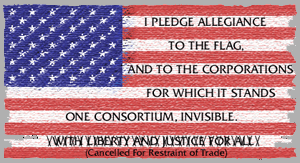Unfortunately, I have a wealth of personal experiences from the events during the World Trade Organization's meeting here in Seattle, most of which aren't pretty (such as being subject to repeated illegal searches on the way to work, witnessing police brutality first-hand, and having tear gas canisters bouncing off my deck). However, I want to address the larger implications of the organization itself, the violence which erupted, and the issues behind it all.
Our democratic system of government provides a series of checks and balances to prevent abuses of power. But what prevents a corporation from doing so? While some corporations admirably recognize the need for thoughtful concern for the public that they hope to market their products to, many corporations frequently pursue profits at the expense of the public interest. These companies who have not developed ethical guidelines, have only one motivation: self-interest. This self absorption and arrogance combined with a lack of regulation and tremendous access to funds, makes the large, multinational corporations in particular, a potential danger to us all. While I don't support irrational regulation, I do feel that government standards help when nothing else will. Government regulation of business is supposed to serve the function of protecting its citizens from those who choose to abuse this power. My question is this: how can this be accomplished effectively, when the politicians who are responsible for serving as this kind of watchdog, are in fact indebted to these same corporations, due to the campaign contributions they have received? If there is a better argument for campaign reform, I’ve not heard it.
The corporate mantra of "Free Trade" doesn’t begin to address the complex consequences associated with unrestricted business practices, and that’s the goal of these types of companies. They attempt to deflect opposition with the plastic wrapper of a short, seemingly harmless slogan, in the hopes that it’s more profoundly dangerous implications will go unnoticed. Put simply, it’s just marketing.
 So what does "Free
Trade" really mean? Does it mean that a corporation is given a blank check to abuse
the citizens of impoverished countries for the sake of their profits? Does it mean that a
corporation can pursue profit even at the expense of the health of their own customers, by
allowing them to poison the water table, or the air, for the sake of convenience and few
extra dollars? Does it mean that they should be allowed to employ children because they
cost less? What right does a corporation have to destroy entire communities by closing
down profitable factories in one country and moving the plant to a poorer nation so they
can pay a lower, unfair wage to those workers? All this, just so the executives at the top
can secure an extra million to line their own pockets? It hardly seems appropriate.
So what does "Free
Trade" really mean? Does it mean that a corporation is given a blank check to abuse
the citizens of impoverished countries for the sake of their profits? Does it mean that a
corporation can pursue profit even at the expense of the health of their own customers, by
allowing them to poison the water table, or the air, for the sake of convenience and few
extra dollars? Does it mean that they should be allowed to employ children because they
cost less? What right does a corporation have to destroy entire communities by closing
down profitable factories in one country and moving the plant to a poorer nation so they
can pay a lower, unfair wage to those workers? All this, just so the executives at the top
can secure an extra million to line their own pockets? It hardly seems appropriate.
In our history, governments have behaved, and in some cases still behave, as recklessly brutal as this with their citizens. Until the advent of democracy. By giving all parties a voice in the decision making process, justice for everyone is more readily attainable.
But no standard of justice or honor governs business. Profit, and profit alone, is the motivating factor behind almost every corporate stance. With this in mind, we must then consider the role of the WTO. This organization, by the contractual agreements of its participants, in some ways holds out the promise of injecting the rule of law and standards of honor into the business community. But how is this possible, if the only representatives at the table, are the corporate interests? What would motivate them to address issues of human rights, fair labor practices, and environmental protection, any more than they are motivated to do so outside of the WTO?
NOTHING. Because they face no potential opposition to their goals. Save for the actions of a few thousand protesters in Seattle. About 40,000 or so....
Frankly, even our police were used toward the ends of corporate power during these events, and it’s not something that I’ve seen addressed in much of the public debate. Martin Luther King said, "There can be no great disappointment, where there is no great love." Police here in Seattle have largely behaved with honor and respect for the citizens they are here to protect. We have one of the lowest crime rates in the country, and I personally have relied on their protection and good judgement in the past. However, I think they should feel just as angry as I do at corporate manipulation, because in truth, during these events, they stopped being our protectors, and turned into an instrument of corporate power and it’s subsequent abuse of that power.
Personally, I don’t find that it’s a coincidence that Capital Hill was the site of violence as opposed another city area on the fringe of the curfew area, namely, Queen Anne. Capital Hill’s populous is made up of the most oppressed segments in our society, gays, young people, the elderly, and those whose ethnicity is other than Caucasian. Those with the least power, became the targets of the most violence.
The issues the WTO raises are the flash point of all the challenges we will face in the 21st century. For our forebearers, the great evils of the time were slavery, and unchecked government power. One of the two has been defeated. The other has been solved on a large scale, especially since the fall of the communist Soviet Union, but many smaller conflicts and more intense abuses have yet to be addressed.
While we work to defeat these last vestiges of the government abuse of power in the next millennium, our greatest challenge will be posed by poverty. Eradicating poverty is a huge, nearly overwhelming goal, but if we do not approach it as an achievable one, we have no hope of combating it whatsoever. We should not forget, the institution of slavery was also viewed as a permanent fixture of the social order. Many sacrifices had to be made to defeat it, but the end of slavery was possible, and so is the end of poverty. But it will require a tremendous amount of commitment on the part of individuals. John Adams said, "There are only two people of value in this world. Those with the commitment, and those who require the commitment of others."
Twelve Days of Trade Talks (tune: 12
Days of Christmas)
On the 12th day of trade talks, my city gave to me:
12 Marchers marching
11 Looters looting
10 Chanters chanting
9 Cops a-freaking
8 Troopers trooping
7 Blocks a-burning
6 Merchants weeping
5 Poison clouds
4 Falling Bottles
3 Blunt clubs
2 Stinging eyes
and Brutality on national TV.
